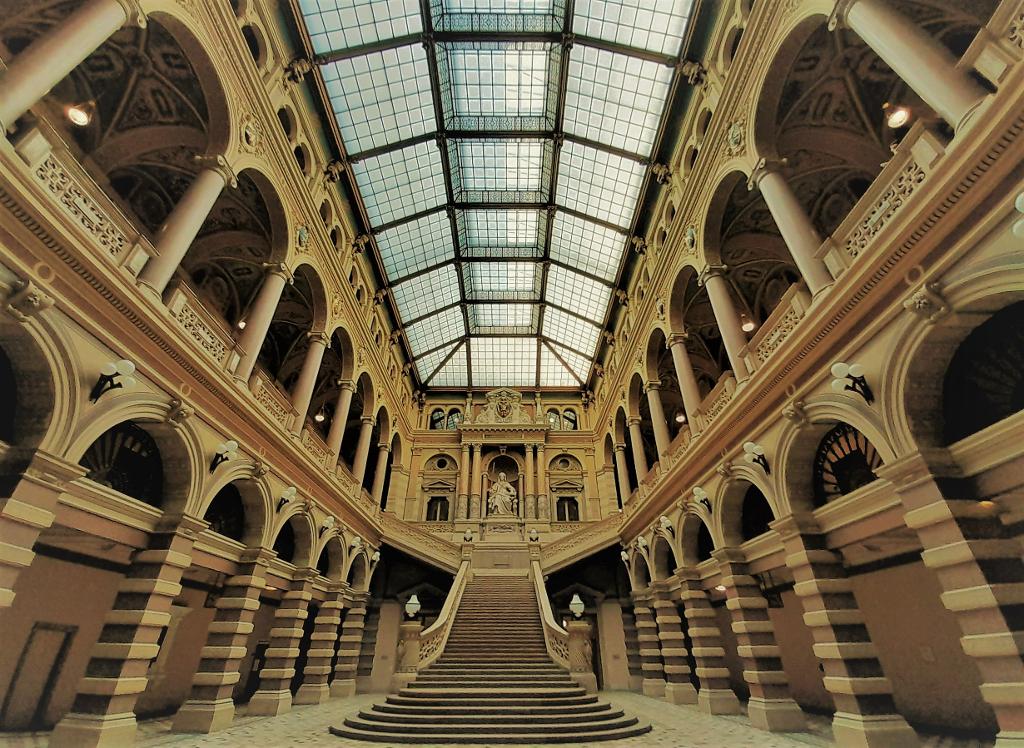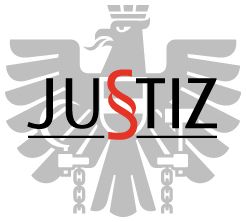Hausordnung / House Rules
[English version see below.]
Vorbemerkung
Im Justizpalast sind Gerichte und Behörden untergebracht. Es finden Strafprozesse und Zivilprozesse statt, zu denen Personen vorgeladen oder Personen aus der Haft vorgeführt werden.
Das Verhalten im Gebäude ist diesem Zweck des Gebäudes anzupassen.
Der Justizpalast ist kein Museum. Der Justizpalast ist keine Kulisse für Werbeaufnahmen, Modefotografie und ähnliche Zwecke.
Allgemeines
1. Personen, die den Justizpalast betreten, unterliegen den Vorschriften des Gerichtsorganisationsgesetzes (GOG) und dieser Hausordnung.
Wer das Gesetz oder die Hausordnung missachtet, der/dem wird der Zutritt verweigert oder sie/er wird aus dem Gebäude gewiesen.
2. Die Hausordnung bezieht sich auf das ganze Gebäude.
3. Die Befugnisse der Richterinnen und Richter bei Gerichtsverhandlungen (Sitzungspolizei) werden von der Hausordnung nicht berührt.
4. Das Hausrecht übt die Präsidentin des Oberlandesgerichts Wien aus.
Die Leiterinnen und Leiter der Dienststellen und Behörden im Gebäude können für ihren Wirkungsbereich weitere Anordnungen erlassen. Davon ist die Präsidentin des Oberlandesgerichts Wien zu verständigen.
Aufenthalt im Gebäude und Sicherheit
5. Personen, die das Gebäude betreten, werden kontrolliert.
Die Anordnungen der Kontrollorgane müssen befolgt werden.
Von der Sicherheitskontrolle ausgenommen sind die in § 4 Gerichtsorganisationsgesetz genannten Personen, wenn sie sich mit einem Dienstausweis oder Berufsausweis legitimieren und erklären, keine Waffen bei sich zu haben.
6. Es ist verboten, Waffen ins Gebäude zu bringen.
Waffen sind alle gefährlichen, zur Bedrohung von Leib und Leben geeigneten Gegenstände (§ 1 Gerichtsorganisationsgesetz).
Von diesem Verbot ausgenommen sind Personen, die zum Tragen von Waffen verpflichtet sind (Justizwache, Polizei, Zollwache).
7. Der Aufenthalt im Gebäude ist nur in einer solchen Kleidung gestattet, die dem Ernst und der Würde der Rechtsprechung angemessen ist.
8. In allen Räumen des Gebäudes ist das Rauchen verboten; das gilt auch für E-Zigaretten, Vaporiser und Ähnliches.
9. Es ist verboten, sich auf den Boden oder auf Stiegen zu setzen.
10. Schriftliche Hinweise, Tafeln, Piktogramme und andere Informationen, die den Zutritt zu bestimmten Gebäudeteilen beschränken, müssen beachtet werden.
11. Es ist verboten, übelriechende oder stark verschmutzte Gegenstände ins Gebäude zu bringen.
12. Es ist verboten, im Gebäude zu lärmen.
13. Es ist verboten, Tiere ins Gebäude mitzunehmen, sofern die Präsidentin des Oberlandesgerichts Wien keine Genehmigung erteilt hat.
Dieses Verbot bezieht sich nicht auf Diensthunde, Blindenhunde und Assistenzhunde.
14. Nicht im Justizpalast beschäftigte Personen dürfen das Gebäude nur durch den Haupteingang Schmerlingplatz 11 betreten.
15. Die Einfahrt in die Höfe ist nur mit Genehmigung der Präsidentin des Oberlandesgerichts Wien gestattet.
16. Die Präsidentin des Oberlandesgerichts Wien kann insbesondere folgende weitere Maßnahmen anordnen:
- Personenkontrollen und Sachkontrollen unter Verwendung technischer Einrichtungen aller Art;
- Verbot des Zutritts für bestimmte Personen;
- Beschränkung oder Verbot des Zugangs zu bestimmten Zeiten und/oder zu bestimmten Bereichen des Justizpalasts;
- Verpflichtung zur Feststellung der Identität oder zur Hinterlegung eines amtlichen Lichtbildausweises;
- Begrenzung des Zutritts für Touristinnen und Touristen.
17. Aus besonderem Anlass können weitere notwendige Sicherheitsmaßnahmen angeordnet werden.
18. Sicherheitsrelevante Vorkommnisse sind unverzüglich im Präsidium des Oberlandesgerichts Wien zu melden (Telefon-Durchwahl 303617, 303378, 303390).
Fotografieren, Filmen, Tonaufnahmen
19. Das Fotografieren und Filmen von Personen ist grundsätzlich verboten. Eine Ausnahme besteht, wenn die betroffene Person (alle betroffenen Personen) zugestimmt haben.
Das Verbot gilt nicht für das Filmen und Fotografieren in Ausübung der Medienfreiheit und der Informationsfreiheit, sofern die Persönlichkeitsrechte gewahrt werden.
20. Während der Gerichtsverhandlungen ist es absolut verboten, zu fotografieren, zu filmen oder Tonaufnahmen anzufertigen (§ 22 Mediengesetz, § 228 Absatz 4 Strafprozessordnung). Unerlaubte Aufnahmen gelten als Störung der Verhandlung im Sinne des § 198 Abs 2 Zivilprozessordnung; die/der Richter/in kann die betreffende Person von der Verhandlung ausschließen.
21. Die Präsidentin des Oberlandesgerichts Wien kann insbesondere zusätzlich anordnen,
- dass Fotoaufnahmen, Filmaufnahmen und/oder Tonaufnahmen nur mit ihrer Genehmigung gestattet sind oder dass sie generell verboten sind;
- dass keine Geräte ins Gebäude mitgenommen werden dürfen, die zur Herstellung von Fotos, von Filmaufnahmen, von Videoaufnahmen oder von Tonaufnahmen geeignet sind.
22. In den Bereichen des Justizpalasts, die anderen Dienststellen zugeordnet sind, sind auch die jeweiligen Bestimmungen dieser Dienststellen zu beachten.
Besichtigung des Justizpalasts, Tourismus
23. Das Gebäude kann nur in der Zeit von 9.30 Uhr bis 15.30 Uhr besichtigt werden.
An Samstagen, Sonntagen und Feiertagen ist das Gebäude geschlossen.
24. Touristinnen und Touristen (das sind Personen, die nicht in diesem Gebäude arbeiten, die nicht zu Gerichtsverhandlungen geladen sind oder sie besuchen, die auch sonst keinen beruflichen Grund haben, das Gebäude zu betreten, und auch keine sonstigen amtlichen Dienste im Gebäude in Anspruch nehmen), müssen beim Betreten des Gebäudes allen anderen Personen den Vortritt lassen.
Pro Stunde werden nur 25 Touristinnen und Touristen in das Gebäude eingelassen.
25. Für Touristinnen und Touristen sind nur die folgenden Orte zugänglich:
- der Eingangsbereich;
- die zentrale Halle (die Aula);
- die Prunkstiege, die in den zweiten Stock führt;
- der Rundgang im zweiten Stock entlang der zentralen Halle (Aula);
- das Justizcafé im fünften Stock (mit dem Lift erreichbar).
Alle anderen Bereiche des Gebäudes sind für Besichtigungen nicht zugänglich.
26. Ausgenommen von diesen Beschränkungen sind ausdrücklich genehmigte Besuche und Veranstaltungen.
September 2024
***
House Rules (English Version)
Preliminary remark
The Palace of Justice houses courts and authorities. Criminal and civil proceedings are being held, to which persons are summoned or brought from custody.
Behaviour in the building must be adapted to the purpose of the building.
The Palace of Justice is not a museum. The Palace of Justice is not a backdrop for advertising shots, fashion photography and similar purposes.
General Information
1. Persons entering the Palace of Justice are subject to the provisions of the Courts Organisation Act (GOG) and these house rules.Anyone who disregards the law or the house rules will be refused entry or expelled from the building.
2. The house rules apply to the entire building.
3. The powers of the judges during court hearings (session police) are not affected by the house rules.
4. The President of the Higher Regional Court of Vienna shall exercise domiciliary rights.
The heads of the departments and authorities in the building may issue further directives for their area of responsibility. The President of the Higher Regional Court of Vienna must be informed of such orders.
Stay in the building and security
5. Persons entering the building will be checked.
The orders of the control bodies must be complied with.
Persons named in § 4 of the Court Organisation Act are exempt from the security check if they identify themselves with a service card or professional card and declare that they have no weapons with them.
6. It is forbidden to bring weapons into the building.
Weapons are all dangerous objects capable of threatening life and limb (§ 1 of the Court Organisation Act).
Persons who are obliged to carry weapons (judicial guards, police, customs guards) are exempt from this prohibition.
7. Persons may only enter the building in clothing appropriate to the seriousness and dignity of the administration of justice.
8. Smoking is prohibited in all rooms of the building; this also applies to e-cigarettes, vaporisers and the like.
9. It is forbidden to sit on the floor or on stairs.
10. Written notices, signs, pictograms and other information restricting access to certain parts of the building must be observed.
11. It is forbidden to bring foul-smelling or heavily soiled objects into the building.
12. It is forbidden to make noise in the building.
13. It is forbidden to bring animals into the building unless the President of the Higher Regional Court of Vienna has granted authorisation.
This prohibition does not apply to service dogs, guide dogs and assistance dogs.
14. Persons not employed in the Palace of Justice may only enter the building through the main entrance at Schmerlingplatz 11.
15. Access to the courtyards is only permitted with the authorisation of the President of the Higher Regional Court of Vienna.
16. The President of the Higher Regional Court of Vienna may in particular order the following additional measures:
- Checks on persons and property using technical equipment of all kinds;
- Prohibition of access for certain persons;
- Restriction or prohibition of access at certain times and/or to certain areas of the Palace of Justice;
- Obligation to establish identity or to deposit an official photo ID;
- Restriction of access for tourists.
17. Further necessary security measures may be ordered for special reasons.
18. Security-related incidents must be reported immediately to the Presidium of the Higher Regional Court of Vienna (telephone extension 303617, 303378, 303390).
Photography, filming, sound recordings
19. Photography and filming of persons is generally prohibited. An exception applies if the person concerned (all persons concerned) have given their consent.
The prohibition does not apply to filming and photographing in the exercise of media freedom and freedom of information, provided that personal rights are respected.
20. It is strictly forbidden to take photographs, film or make sound recordings during court hearings (§ 22 of the Media Act, § 228(4) of the Code of Criminal Procedure). Unauthorised recordings are deemed to be a disturbance of the hearing within the meaning of § 198(2) of the Code of Civil Procedure; the judge may exclude the person concerned from the hearing.
21. The President of the Higher Regional Court of Vienna may in particular additionally order,
- that photographs, film recordings and/or sound recordings are only permitted with their authorisation or that they are generally prohibited;
- that no equipment suitable for taking photographs, filming, video recording or sound recording may be taken into the building.
22. In areas of the Palace of Justice that are assigned to other departments, the respective regulations of these departments must also be observed.
Visits to the Palace of Justice, tourism
23. The building can only be visited between 9.30 am and 3.30 pm.
The building is closed on Saturdays, Sundays and public holidays.
24. Tourists (i.e. persons who do not work in the building, who are not invited to or attending court hearings, who have no other professional reason to enter the building and who are not using any other official services in the building) must give way to all other persons when entering the building.
Only 25 tourists per hour are admitted to the building.
25. Only the following areas are accessible to tourists:
- the entrance area;
- the central hall (assembly hall);
- the grand staircase leading to the second floor;
- the gallery on the second floor along the central hall (assembly hall);
- the Justizcafé on the fifth floor (accessible by lift).
All other areas of the building are not accessible for tours.
26. Excluded from these restrictions are expressly authorised visits and events.
As of: September 2024
***
Zum Thema „Filmen und Fotografieren im Justizpalast“ wird auch auf die Information unter „Downloads“ verwiesen. Beachten Sie auch die „Information for Visitors“: Besichtigung | Information for Visitors
-
pdf
-
pdf
Hinweis
Wer die in der Hausordnung vorgesehenen Anordnungen missachtet und deshalb eine zur Rechtsverfolgung oder Rechtsverteidigung notwendige Verfahrenshandlung nicht vorgenommen hat oder einer Verpflichtung im Gericht nicht nachgekommen ist, ist als unentschuldigt säumig anzusehen (§ 16 Absatz 5 Gerichtsorganisationsgesetz).

